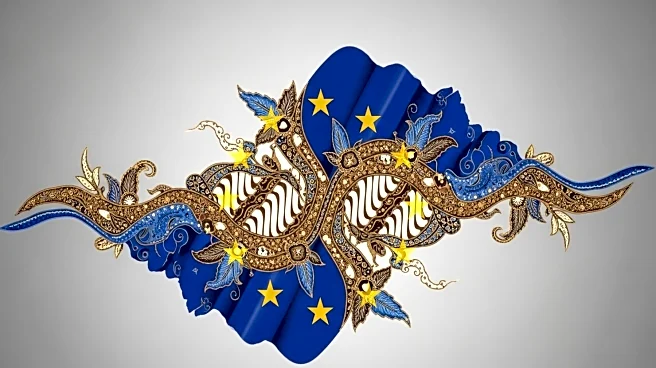What's Happening?
Indonesia and the European Union have concluded a free trade agreement aimed at boosting exports and investment while countering the impact of tariffs imposed by President Trump. The agreement, finalized after nine years of negotiations, will see both parties remove import duties on over 90% of products, with Indonesia's 50% duty on EU cars being phased out over five years. The EU anticipates saving €600 million ($707.4 million) in Indonesian duties and plans to increase exports of chemicals, machinery, automobiles, and food products. Indonesia expects to enhance its exports of palm oil, coffee, textiles, and clothing, with the pact set to take effect by January 1, 2027. The deal is part of the EU's strategy to reduce dependency on China, especially for minerals crucial to its green transition.
Why It's Important?
The trade agreement between Indonesia and the EU is significant as it aims to mitigate the economic impact of President Trump's tariffs, which have affected Indonesian exports with a broad 19% US tariff. By fostering new trade alliances, the EU seeks to diversify its economic partnerships and reduce reliance on China, particularly for minerals essential to its clean tech and steel industries. This deal could lead to increased investment in Indonesia by European companies, enhancing access to critical minerals like nickel, copper, bauxite, and tin. The agreement also positions Indonesia to become an upper-middle-income country, potentially losing access to preferential EU duties granted to developing nations.
What's Next?
The trade agreement will undergo legal checks and translation into the EU's official languages before receiving formal consent from EU governments and the European Parliament. Indonesia is also in discussions with EU automakers for partnerships in battery and electric vehicle production. The Indonesian Palm Oil Association has expressed concerns over non-tariff barriers, such as the EU Deforestation Regulation, which could impact the effectiveness of the trade agreement. The regulation requires documentation proving shipments did not originate from deforested areas post-2020, posing challenges for Indonesia's palm oil exports.
Beyond the Headlines
The trade deal highlights the broader geopolitical shifts as countries seek to navigate the complexities of global trade amidst tariffs and environmental regulations. The EU's focus on securing access to critical minerals underscores the strategic importance of resource diversification in the context of transitioning to green technologies. Indonesia's efforts to align with EU standards, particularly in environmental compliance, reflect the growing influence of sustainability in international trade agreements.









